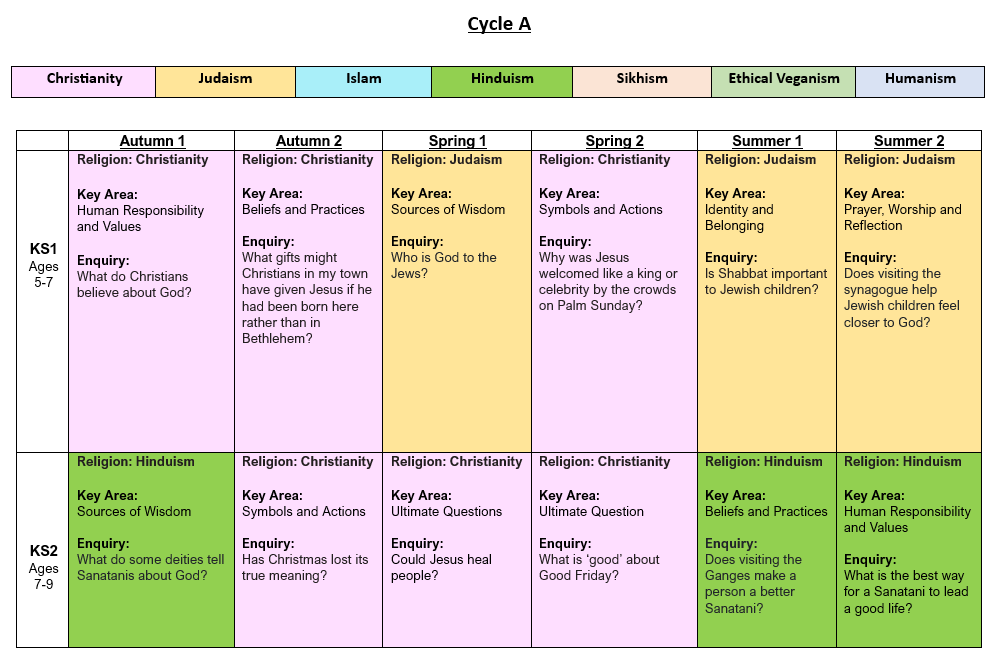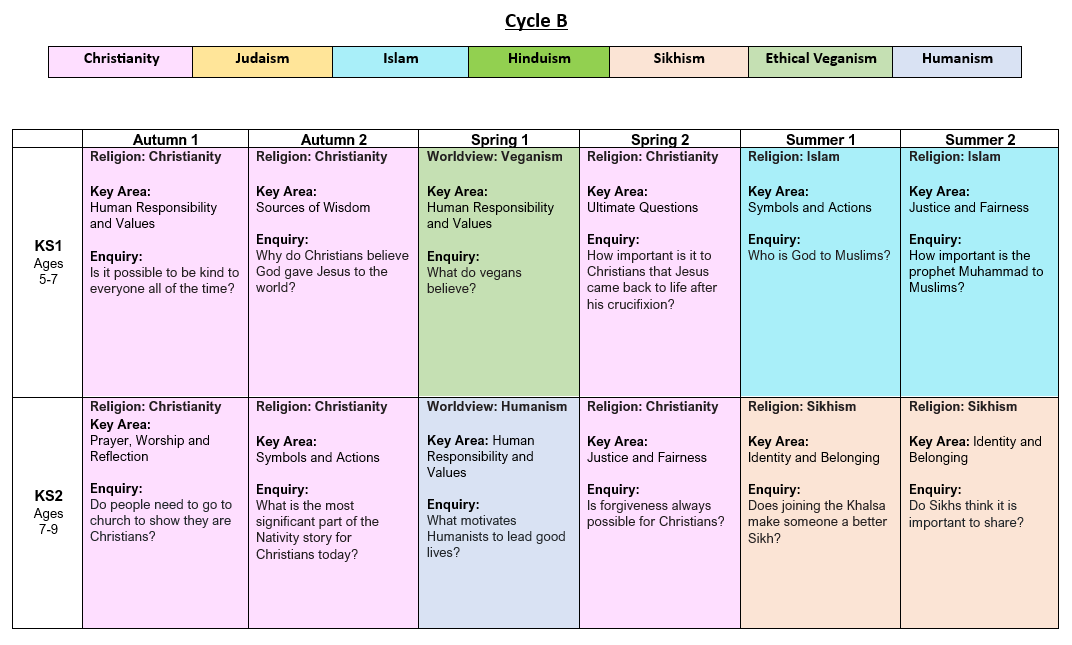Religious Education
Religious Education at Buntingford First School will develop students’ knowledge and understanding of religious beliefs and practices as well as exploring moral debates whilst taking into consideration spiritual, moral, social and cultural development. Alongside this, students will cover PSHE (Personal, Social, Health and Economic) education which equips children with the knowledge and skills necessary for students to live healthy, safe, productive, fulfilled, capable and responsible lives.
Through up-to-date resources, outside agencies, challenging and engaging projects students learn about the six major world religions, ethical issues that people face in life and British values.
All students will be able to express their beliefs and ideas through written, creative and spoken communication. We'll be dedicated to ensuring that our students leave the school with the skills and knowledge to enable them to play a vital role in their communities and to embrace a modern and diverse world.
Why is Religious Education important?
By following Jigsaw RE at Buntingford First School, we intend that Religious Education will:
- adopt an enquiry- based approach as recommended by Ofsted, beginning with the children’s own life experience before moving into learning about and from religion.
- provoke challenging questions about the meaning and purpose of life, beliefs, the self, and issues of right and wrong, commitment and belonging. It develops pupils’ knowledge and understanding of Christianity, other principal religions, and religious traditions that examine these questions, fostering personal reflection and spiritual development.
- encourage pupils to explore their own beliefs (religious or non-religious), in the light of what they learn, as they examine issues of religious belief and faith and how these impact on personal, institutional, and social ethics; and to express their responses.
- enable pupils to build their sense of identity and belonging, which helps them flourish within their communities and as citizens in a diverse society.
- teach pupils to develop respect for others, including people with different faiths and beliefs, and helps to challenge prejudice.
- prompt pupils to consider their responsibilities to themselves and to others, and to explore how they might contribute to their communities and to wider society. It encourages empathy, generosity, and compassion.
- develop a sense of awe, wonder and mystery.
- nurture children’s own spiritual development.
When is Religious Education taught?
In KS1 and KS2, we teach RE as a discrete subject at our school and children have an RE lesson every week. Jigsaw RE brings together learning about and from religion, questioning and spiritual development in a comprehensive scheme of learning. Teaching strategies are varied and are mindful of teaching and learning theories and the need for adaptive teaching. Each enquiry starts from the children’s own life experiences using these as a bridge into the investigation of the religion being studied. Learning is assessed and children have opportunity to express their own thoughts and beliefs and empathise with believers of that religion or belief position.
In our EYFS, children get to experience RE as part of their ‘Understanding the World’ specific area of learning. They learn about people, culture, and communities. In this area of learning, children will broaden their understanding of different people including their cultures, religious beliefs, and their individual contributions to society. Children will learn to recognise that people have different beliefs and celebrate special times in different ways. Opportunities for children to learn about and engage with religious and cultural celebrations and practices will be taught throughout the year at appropriate times.
How is Religious Education taught?
Jigsaw RE covers all areas of RE for the primary phase. Christianity plus one other religion is taught in each Key Stage. Due to the fact we have mixed-age classes, we follow a rolling programme for the scheme of work (Cycle A and Cycle B). This ensures that the children are exposed to a number of religions throughout their time spent with us. The grid below shows specific enquiries for each Key Stage. We use the term ‘Worldview’ below to encompass both religions and worldviews.


What do we learn in Religious Education?
In their RE lessons, KS1 children will learn about the following during their time with us:
- Creation, God the Father as an introduction to the Trinity.
- Incarnation, God the Son – continuation of introduction to the Trinity.
- Salvation, God the Son – continuation of introduction to the Trinity.
- Introduction to Judaism including God's covenant with Abraham, the Jewish belief in one God, the story of Moses and the 10 Commandments, and the 613 Mitzvot.
- Shabbat - The Jewish creation story, Shabbat, and the synagogue as a place of worship during Shabbat.
- Synagogue - The importance of Jerusalem and pilgrimage there, and the synagogue as a place of worship and community.
- Jesus's example as the Son of God.
- Christmas - Jesus as a gift from God (incarnation).
- Salvation - Resurrection of Jesus at Easter.
- The meanings of and the attributes shown by the 99 names of Allah and how a Muslim may want to show respect to these.
- Events in the life of the prophet Muhammad and their impact on and importance to Muslims today.
- How Muhammad received the Qur'an in the Night of Power, how a Muslim would treat the Qur'an with respect and the importance of its teachings to Muslims today.
In their RE lessons, KS2 children will learn about the following during their time with us:
- The meaning of Christmas to Christians including extending kindness and considering why Jesus was born (the incarnation).
- Jesus' Miracles including the healing of the leper, the healing of the wise man and the healing of the paralysed man.
- The Easter story and its meaning to Christians in the belief that Jesus came back to life and therefore they may receive life after death.
- Brahman as one supreme being in everything and everywhere. The Trimurti and what each aspect of Brahman represents. The Sanatani belief that there is one God in many different forms and how these deities are present in Sanatani beliefs and worship.
- The story of Rama and Sita, what a Sanatani might learn from it and how it informs some elements of Sanatani practice.
- The importance of the River Ganges to Sanatanis and why they would make a pilgrimage there. What actions are taken at Varanasi because of the belief of Brahman in everything including the waters of the river.
- The life and teachings of Guru Nanak, the importance of the Guru Granth Sahib and three most important Sikhi beliefs.
- Guru Nanak as a special teacher and leader, the 10 Gurus, Guru Gobind Singh and the Khalsa and its impact today.
- Amrit ceremony, the promises made, events of how the first Khalsa was formed, reasons why a Sikh may or may not choose to join the Khalsa, the meaning of the 5Ks and how they are important to Sikhs today.
- Revisiting the Christmas story with a focus on the symbolism of different parts and how they might be meaningful in different ways to different people, including the use of the Christingle.
- Revisiting the Easter story with a focus on the teaching of Jesus about forgiveness (7x70 times) and the people that Jesus forgave (Peter and the people who crucified him and were crucified with him).
- Uses of the church for worship and other events such as baptism and taking of Holy Communion.
How do we assess and monitor in Religious Education?
Teachers are eager to ensure children are making progress with their learning throughout their RE. Therefore, each enquiry has built-in assessment. This task is the formal opportunity for teacher assessment of the children’s knowledge of that religion, depth of critical thinking, and ability to answer the enquiry question. This stand-alone evidence is used in conjunction with other evidence such as records of discussions, recorded work and annotations from other lessons within the enquiry to assist the teacher in assessing whether a child is working at the expected level or towards or beyond it. Children are assessed over three aspects of learning:
- a personal resonance with or reflection on the material/religion being studied to answer the enquiry question
- knowledge and understanding of the material/religion being studied to answer the enquiry question
- evaluation/critical thinking in relation to the enquiry question
The RE subject leader monitors delivery of the programme through observation and discussion with teaching staff, as well as discussions with children and scrutiny of their written work to ensure consistent and coherent curriculum provision.
Evaluation of the programme’s effectiveness is conducted on the basis of:
- Pupil and teacher evaluation of the content and learning processes
- Staff meetings to review and share experience
- Monitoring of assessment to ensure progression throughout the school
What does inclusion look like for children with SEND in RE?
This table includes some of the strategies which may be used as reasonable adjustments to support children with SEND in this subject area.
|
Communication and Interaction |
Cognition and Learning |
|
• a range of alternative ways to record understanding, e.g. verbally, pictorially, digitally
• visuals and multi-media to support pupils’ understanding
• scaffolded talks to reduce cognitive load
• different formatting to reduce cognitive load and processing instructions
• adapted planning and resources to facilitate children’s next steps appropriate to their level
|
• a range of alternative ways to record understanding, e.g. verbally, pictorially, digitally
• visuals and multi-media to support pupils’ understanding
• scaffolded talks to reduce cognitive load
• different formatting to reduce cognitive load and processing instructions
• adapted planning and resources to facilitate children’s next steps appropriate to their level
• word banks with visuals where appropriate
• writing and speaking frames
• explicit teaching, modelling and oral rehearsal of new subject-specific vocabulary
• pre-teaching of new vocabulary
• talk partners to rehearse vocabulary
• working walls on displays with subject-specific vocabulary
• use of artefacts, visits to places of religious significant and visuals during teaching to support understanding |
|
Social, emotional and mental health difficulties |
Sensory/ or physical needs |
|
• scaffolded talks to reduce cognitive load
• different formatting to reduce cognitive load and processing instructions
• chunked instructions
• opportunities to share experiences and own spirituality
• opportunities to learn about religious figures who have overcome hardship and challenge in their lives |
• ensuring visits to places of religious significance are fully accessible
• adapting resources where needed to ensure all pupils can access the materials |


